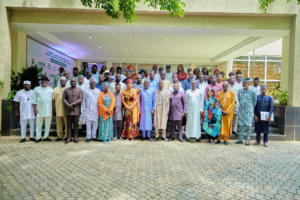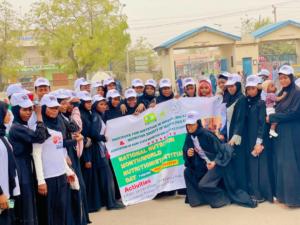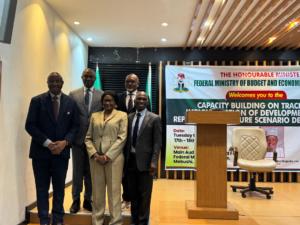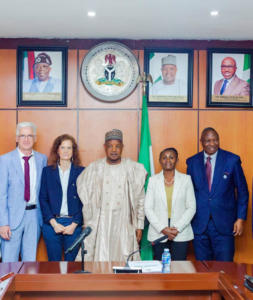As part of the effort to reposition the then NPC (now MBEP) as a pacesetter organization and improve service delivery, the need for a reform cannot be over emphasized. The reform had become necessary in view of the increasing role of the Commission in the economic management of Nigeria and the need for effective performance of its workforce. This will enable it transform into an enviable and result oriented organization. A major part of the process is the transformation of Public Infrastructure Utility to the Department of Infrastructure.
Vision
To be an effective and efficient Department in the articulation of policies, programs and projects that will ensure the proper development of the Nation’s Infrastructure
Mission
To liaise with the relevant MDAs in the articulation, coordination and implementation of policies, programs and projects in the Infrastructure, Governance and Security sectors for sustainable economic growth and development.
The Department is structured into two divisions namely:
Physical Infrastructure Division
Security and Governance Division.
The Physical Infrastructure Division deals with issues of Transportation (Roads, Rail, Waterways and Pipelines), Power and Communications, whereas the Security and Governance Division covers Internal and External Security; and Governance issues such as human rights, public service delivery, elections, Justice and Judiciary among others.
PRIMARY MANDATE
The Infrastructure Department is charged with the following responsibilities:
- Assist in the formulation of broad policies for Infrastructure and Security and Governance sectors.
- Undertake periodic review and appraisal of policies programmes and projects implemented in the sector;
- Set sectorial priorities (policies, programmes and projects) in collaboration with relevant MDAs in the sectors.
ONGOING ACTIVITIES
Development of a National Integrated Infrastructure Master Plan (2014-2043). The objectives of the Plan include the following;
- Achieving a coordinated approach to physical infrastructure.
- Strengthening of the linkages between infrastructure sectors and the national economy
- Set sectorial priorities (policies, programmes and projects) in collaboration with relevant MDAs in the sectors.
- Harmonising and integration of the several, disparate, infrastructure plans
- Prioritisation of projects and programmes for implementation
- Promotion of private sector participation
- Strengthening of the policy, legal, regulatory and institutional frameworks
- Enhancing the performance and efficiency of the economy
- Coordination of the Inter-Ministerial Committee meetings on the development of a National Policy Framework for the protection of Critical Infrastructure in Nigeria;
- National Infrastructure Surveillance
- Quarterly Forum with Key Infrastructure MDAs at the Federal Level.;
- Quarterly Forum with Key Infrastructure MDAs at the Federal Level.;
- Development of the Annual National Infrastructure Report (NIR);
- Secretariat support for the National Road Advisory Council Technical Working Group (NarSac-TWG): (AD-HOC)
PLAN ACTIVITIES/ NEXT STEPS
- Annual public-private dialogue on Infrastructure financing;
- National Infrastructure Surveillance;
- Sensitization Workshop across the six (6) Geo-Political Zones on Infrastructure Development.
- Update of National infrastructure database/National Infrastructure Register;
- National Infrastructure Quarterly Coordination Forum with MDAs on Infrastructure Delivery;
- Meetings of the National Council on Infrastructure
- Meeting of the National Technical Working Group on Infrastructure





